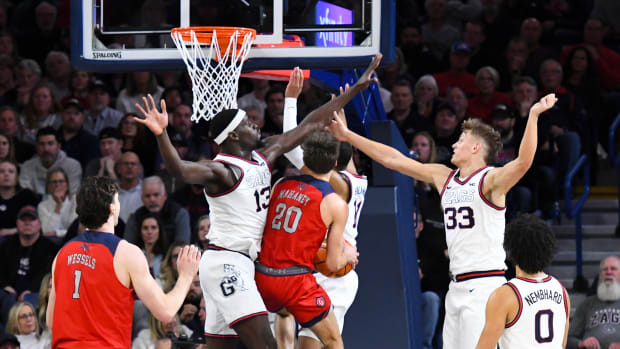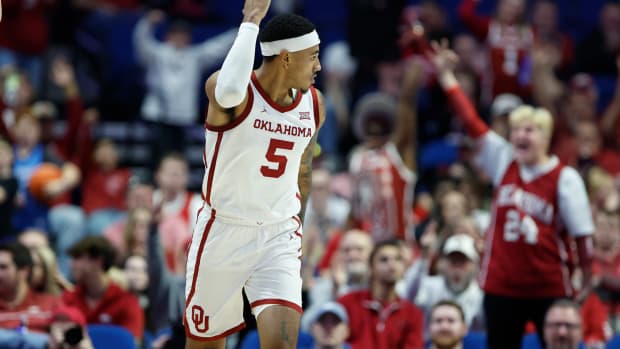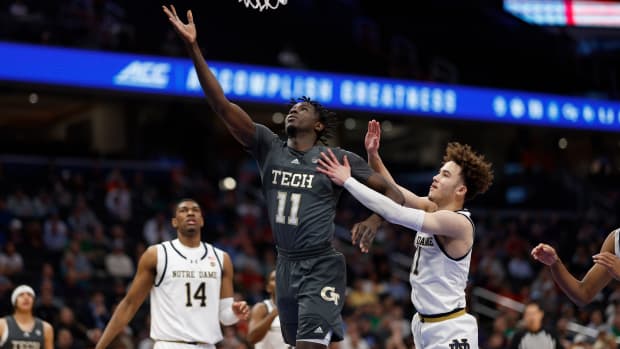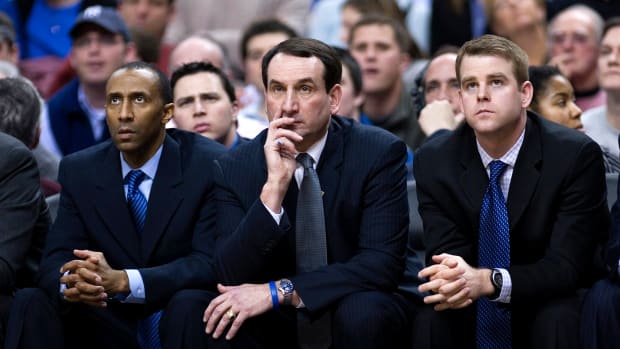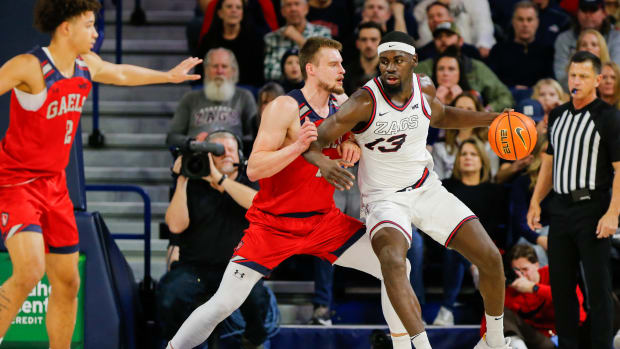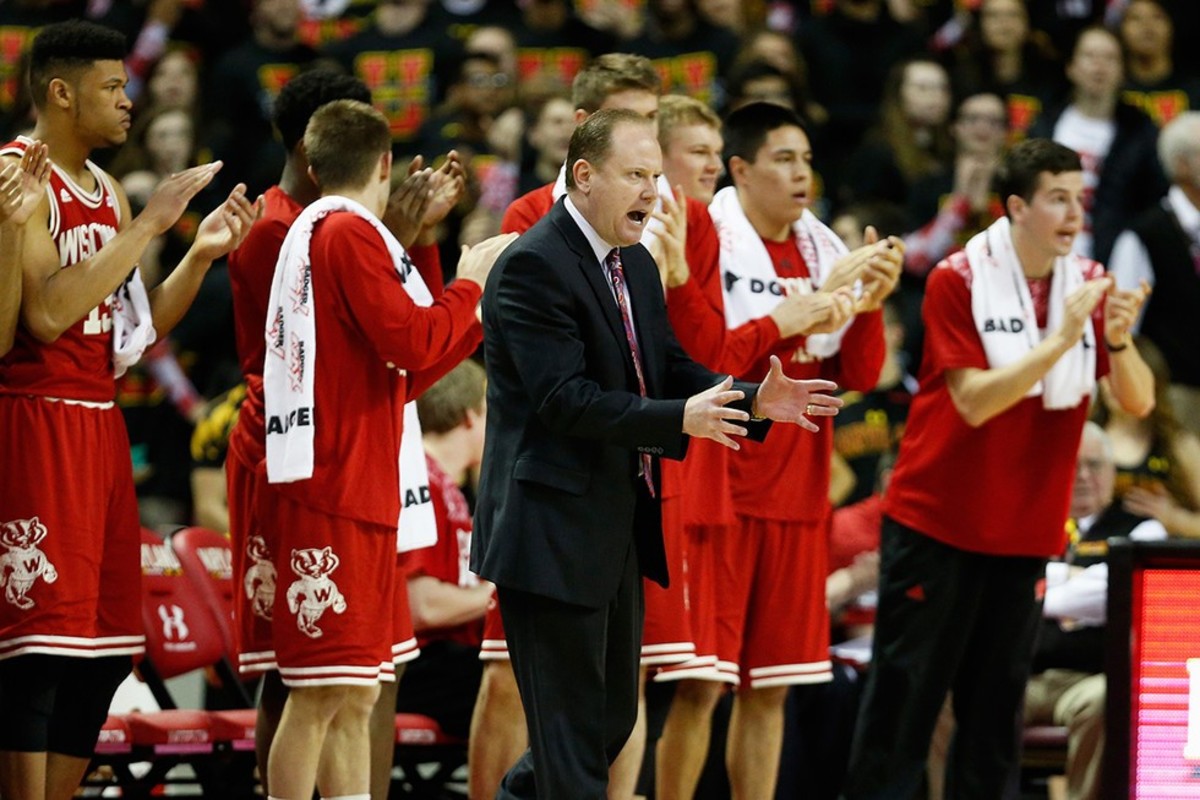
On Gard: Interim Wisconsin coach Greg Gard has Badgers back on track toward NCAA tournament
MADISON, Wis. — "I know it's a red folder," Greg Gard says, as he roots around a blast zone of papers near his desk, as well as on the floor behind it.
In the office of the interim Wisconsin basketball coach, which is also the office for a permanent Wisconsin basketball coach, the search is on for notes from a clinic in 1992. It was held at Indiana and presided over by Bob Knight. Only two years after he started his career as a jayvee coach, Gard assiduously recorded the wide array of drills, defensive sets and zone offenses the legendary Hoosiers coach presented over a couple days. He less assiduously noted the names of assistants—Gard recalls identifying then-Indiana aide Dan Dakich as Dan "Dockridge," because he had no clue who the guy was—and he has kept those notes and the flier for the clinic ever since.
Where he kept them is the issue. After Gard took over for the suddenly retired Bo Ryan in mid-December, staffers moved his belongings to the head coach's suite. He insisted upon personally filing everything away, so he could sort through it all. On the table next to his desk, there are three piles of binders and two piles of folders, bursting with playbooks and practice plans. There are maybe a dozen small stacks of folders and documents on the floor behind his chair. Somewhere in there are the clinic notes. Somewhere in the data and wisdom collected over a quarter-century of coaching, Greg Gard is certain he can find what he's looking for.
"Like I said," he tells his visitor, "it's an adventure around here right now."
Though anxiety and uncertainty followed Ryan's unexpected Dec. 15 departure, the Badgers' fortunes are now far more settled than their coach's filing system. They've won eight of nine games heading into a showdown at No. 8 Iowa on Wednesday and, at 17–10 overall and 9–5 in Big Ten play, they are trending toward an 18th straight NCAA tournament bid that seemed no sure thing as recently as mid-January. At that point, Wisconsin had added four Big Ten losses (in five games) to its five nonconference defeats—featuring an inexplicable season-opening 69–67 dud against Western Illinois, which is now 9–16 for the year. The core that reached consecutive Final Fours, and the coach that guided it, were gone. And the Badgers needed some work on transition.
"Last year, we kind of got away from some good habits that we needed to have," junior guard Zak Showalter says. "We were so talented that we could kind of cover up some of those things. With this group of guys, we couldn't take any shortcuts."
*****
David Stluka/AP
Bo Ryan called Gard on the afternoon of Dec. 15 and detailed plans to announce his retirement that evening. Ryan's decision was so abrupt that it was beneficial: It squeezed out time for nerves or deep contemplation. "When you get all the other plates spinning in your life and everything coming at you from 100 different directions, your focus has to be on your team," he says. Indeed, about the only guy not panicking during the initial stumbles was the one with the most to lose. Gard had changed the offense. He asked the Badgers to improve their most basic habits. He informed his team that it wasn't permitted to feel sorry for itself, citing several examples of what he considered true adversity, including the loss of his father to brain cancer in October. This fresh foundation just needed time to settle.
And, if nothing else, Gard is adept at waiting. He took no shortcuts after growing up in miniscule Cobb, Wis. (pop. 463), adjusting rabbit ear antennae to watch Big Ten games on his basement television. He started as a jayvee coach and varsity assistant at Southwestern High School in Hazel Green, Wis., before moving on to Platteville (Wis.) High School, and then finally linking up with Ryan at Wisconsin-Platteville in 1994. He spent 23 years as Ryan's trusted lieutenant at three schools, the last 14-plus in Madison. Gard was the ultimate dues-payer, and finally his time had come.
And that's fine. That story shaped who he is. But paying dues guaranteed nothing. If Gard wanted a long-term lease on that new office, he had to demonstrate he could fix things in the gym downstairs. He had to be good at the job he was asked to do now. "I told the team that, too, when that 'audition' word starting going out there—I said, this is not my audition," Gard says. "This is not about me. This is about getting our season going in the right direction ... Whatever happens down the road, I'm going to coach you guys the same way, whether I have a three-month contract or whether I have a 10-year contract. I'm going to push you. I'm going to prod you. I'm going to teach you."
His first lesson: Telling his team what it didn't know.
As Gard says, there was a lot of "not knowing." Sixty-six wins in two years and back-to-back Final Fours did not spoil the Badgers as much as it deluded them. "Our culture was skewed," Gard says. His point: those victories didn't just happen. A much less polished roster required more fundamental work—but perhaps more importantly, an understanding of the value in that work. Even key Final Four holdovers like juniors Nigel Hayes and Bronson Koenig had to be disabused of certain theories: They claimed the leadership mantel for 2015–16, but when had they ever learned how to pick a college team up after a spectacular failure like Western Illinois? Or during a three-game losing streak? "Definitely a trap that I guess you could say was waiting for us," Hayes says.
So Gard took a team victimized by its own assumptions—"I've asked them how you break down 'assume,'" he says—and began a brick-by-brick rebuild.
At the rear of the Wisconsin players' lounge, a table stands by the door to the locker room. On it rest more than 30 actual bricks. After his promotion, Gard handed each player, coach and staffer his or her own brick. He asked that they write one word or phrase on it, something meaningful in the context of what they could offer the team. One brick reads "Selfless." Another reads "Heart." Yet another reads "Fight." Hayes's contribution was blunt: "WIN." (Gard's own contribution: "Leader.") Then each individual signed the brick and stacked it on the table. It has tipped over since, but the symbolism has held firm.
Can't build anything with just one brick, Gard told his players, who pass by the reminders of their self-assigned responsibilities every day.
"It helped get us in the right frame of mind," Gard says. "When we were mentally wavering, a little fragile, it got us all looking in the same direction."
Then there was the matter of the problem on the floor. The drudgery of Wisconsin's offense in particular through mid-December—103rd nationally in efficiency on the day of the coaching shift—demanded new ideas. "Our offense was just all over the place," Koenig says. "Very stagnant. No spacing whatsoever. It was kind of a mess."
Here, Gard made a bold choice: Go to an old idea. He reinstalled the Swing, the signature offensive system essentially invented by Ryan. Because veterans like Frank Kaminsky and Sam Dekker and Josh Gasser flowed so well off each other during the two Final Four runs, running by-the-book Swing grew less essential. Veterans hadn't done it much. Newcomers hadn't done it at all. And everyone had about a week to get it down.
But the Badgers were happy for the crash course. "The Swing is a spacing mechanism," Hayes says. "We didn't run Swing (last year)—we spaced extremely well, because we had four guys around Frank and we played off of that. At the beginning of [this] year, we had guys on top of each other. By him implementing the Swing, it gave people landmarks where to be on the court. A lot of guys didn't have a grasp of spacing, and knowing how to play off of one another."
In Gard's first game as interim coach, the Swing helped produce a 30-point second-half lead against Wisconsin-Green Bay ... one that nearly disappeared entirely in an 84–79 victory on Dec. 23. Nevertheless, the trajectory had been reset. Wisconsin is now 55th nationally in adjusted offensive efficiency after finishing fourth and first the last two seasons, respectively. A far cry, yes. But this is one of those incremental improvements Gard anticipated.
He devours coaching tomes and has adapted the idea of The Process, made famous by Alabama football coach Nick Saban: Don't focus on the end result. Focus on every job and drill and practice along the way, and the end result will take care of itself. So Gard emphasized fundamental improvements in practice and now gets more consistently productive efforts. He offered Hayes and Koenig advice based on how he'd seen other successful leaders drive a team out of doldrums, and in turn, the veterans called a players' meeting after the bus ride back from a desultory Jan. 12 loss at Northwestern. That set the tone for a seven-game win streak that resuscitated the season. "We just told each other that we need to do everything individually that we can do to help this team succeed, no matter how big or small it is, no matter if you play or not," Koenig says.
After practice Monday, redshirt freshman forward Ethan Happ held court for a small bank of recorders and television cameras with his hands folded behind his back. As Koenig left the floor, the junior guard passed behind Happ and caressed his hand, trying to muck up the interview. Following a Feb. 10 win over Nebraska, the Badgers passed the time during postgame interviews by playing rock-paper-scissors under the table on the media room dais. They may not recapture the vibe of last year's crew, which turned news conferences into performance art. But a bit of breeziness is an auspicious sign. It's nice to breathe easy when, not too long ago, it felt like all the air had left the building.
*****
Andy Manis/AP
Every game, Greg Gard carries his father's funeral card in his suit coat pocket. Glen Gard died at 71 years old on Oct. 30 following a six-month battle with gliobalstoma multiforme, a form of brain cancer. Glen sat behind the bench and offered a thumbs-up after every win for nearly three decades, and thus his absence was pronounced even before his son moved over a seat on the Wisconsin bench. And there is, of course, regret that Glen would not see Greg realize this dream.
At that thought, Greg Gard, 45 years old and a father of three, takes a sip of bottled water to stifle whatever is welling in his throat. He then assures you that he believes this has happened for a reason: The disease; playing "Doctor Google" all those nights, as he puts it, scouring the Internet for a new treatment; thinking about what the cancer did to his father and what it put his family through. "There would be nothing professionally that was ever going to match that," Gard says. "It wasn't going to matter what came at me professionally. It was nothing compared to what I watched over that six months. It's been a life-changing experience. Not that I didn't have perspective before, but I have more perspective. It's helped me in this position, without a doubt."
How Greg Gard got here is important. But there is nothing sentimental about what happens next.
He must do this job and do it well, and it doesn't matter how many tough jobs he had before, or how well he did any of them. He'll be judged, in large part, on what Wisconsin accomplishes by the end of March. Gard says athletic director Barry Alvarez, Wisconsin's longtime football coach, has given him space and has been a priceless counsel. Alvarez recently offered an affirming review—"All I can say is I've been very impressed with the job he's done," he told the Milwaukee Journal-Sentinel on Feb. 16—but Gard doesn't have the gig until he's offered the gig.
The players, for what it's worth, believe their coach is in place already. "He's a little more of a player's coach than coach Ryan was," Koenig says with a smile. "I definitely want him to get the job. I'm sure everyone else does, too." This goes slightly against Gard's wishes, in that he instructed the Badgers not to think about this at all. He won't even discuss how much he wants the job, as plain as that seems.
"I've always had a one-year contract," Gard says, referring back to his high school coaching days. "I've always had the mindset of, hey, if you don't do a good job, you might not be asked back."
It's midday on Monday, just a few hours after Gard's team completed a comeback from a 13-point second-half hole to beat Illinois 69–60, when a visitor pokes his head into the office doorway. Josh Gasser has a flight to catch to Germany, where the ex-Badgers guard and captain now plays professionally. He was stateside due to an injury and came through Madison to pick up some souvenirs: Big Ten championship and Final Four rings from last season, trinkets that conveniently measure how long ago that was and how far the Badgers have come since.
The Illinois game comes up as Gard and Gasser chat, and Gard notes that it was ugly for a while, what with Wisconsin missing 12 of 13 three-pointers before halftime. Sometimes that happens, Gasser tells him with a laugh. He points out that the big, bad marauding Badgers of last year lost at woebegone Rutgers.
Sometimes, things just need a little fixing, and soon you hardly remember when anything was wrong at all.
"Good to see you," Gasser says, looking Wisconsin's interim coach in the eye. "Good to see you doing well."
"We're trying," Greg Gard says. "We're trying."


